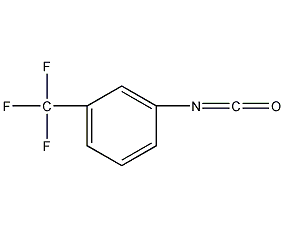3-(Trifluoromethyl)phenyl isocyanate


Structural formula
| Business number | 048J |
|---|---|
| Molecular formula | C8H4F3NO |
| Molecular weight | 187 |
| label |
Pesticide intermediates; aromatic nitrogen-containing compounds and their derivatives |
Numbering system
CAS number:329-01-1
MDL number:MFCD00002020
EINECS number:206-341-3
RTECS number:NR0200000
BRN number:744880
PubChem number:24849812
Physical property data
1. Physical property data
Properties: colorless transparent liquid
Density (g/mL, 25/ 4℃): 1.359
Relative vapor density (g/mL, air=1): Not available
Melting point (ºC): – 26
Boiling point (ºC, normal pressure): 54
Boiling point (ºC, 5.2kPa): Not available
Refractive index: 1.467
Flash point (ºC): 59
Specific rotation (º): Not available
Autoignition point or ignition temperature (ºC): Not available
Vapor pressure (kPa, 25ºC): Not available
Saturated vapor pressure (kPa, 60ºC): Not available
Heat of combustion (KJ/mol): Not available
Critical temperature (ºC): Not available
Critical pressure (KPa): Not available
Oil and water (octanol/water) Log value of partition coefficient: Not available
Explosion upper limit (%, V/V): Not available
Explosion lower limit (%, V /V): Not available
Solubility: Insoluble in water.
Toxicological data
2. Toxicological data:
Acute toxicity: LD50: 975 mg/kg (rat oral) LC50: 3600 mg/m3 (rat inhalation).
Ecological data
3. Ecological data:
1. Other harmful effects: This substance is harmful to the environment. Do not let this substance enter the environment. .
Molecular structure data
1. Molar refractive index: 40.91
2. Molar volume (cm3/mol): 148.8
3. Isotonic specific volume (90.2K ): 349.2
4. Surface tension (dyne/cm): 30.2
5. Polarizability (10-24cm3):16.21
Compute chemical data
1. Reference value for hydrophobic parameter calculation (XlogP): None
2. Number of hydrogen bond donors: 0
3. Number of hydrogen bond acceptors: 5
4. Number of rotatable chemical bonds: 1
5. Number of tautomers: none
6. Topological molecule polar surface area 29.4
7. Number of heavy atoms: 13
8. Surface charge: 0
9. Complexity: 220
10. Number of isotope atoms: 0
11. Determine the number of atomic stereocenters: 0
12. Uncertain number of atomic stereocenters: 0
13. Determine the number of chemical bond stereocenters: 0
14. Number of uncertain chemical bond stereocenters: 0
15. Number of covalent bond units: 1
Properties and stability
This product is toxic and highly irritating to the mucous membranes of human eyes and respiratory organs. Absorption through the skin can cause poisoning. The maximum allowable concentration in the air in the workplace is 0.14 mg/m3.
Storage method
None
Synthesis method
The preparation method is to add 3-trifluoromethylaniline and chlorobenzene in a reaction bottle and stir to make it Mix and dissolve, cool to 0~10°C, add dry hydrogen chloride to make it saturated, then add N, N-diisobutyl chloromethylamide, heat to 50°C and keep for 30 minutes, then add phosgene, and pass through After a certain amount of phosgene is added, the reaction ends. Nitrogen is introduced to drive out the hydrogen chloride and remaining phosgene in the material. After the hydrogen chloride and remaining phosgene are driven out, the material is distilled and desolvated to obtain the finished product.
Purpose
Mainly used as pharmaceutical and pesticide intermediates.
